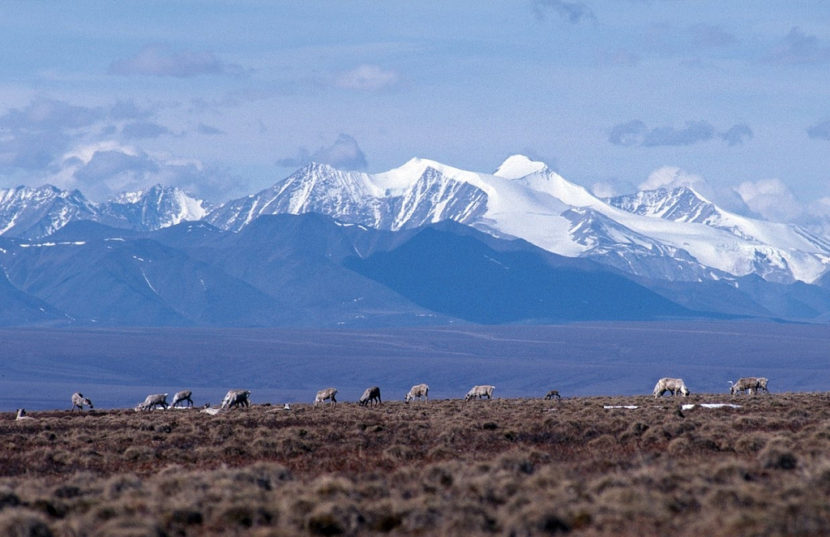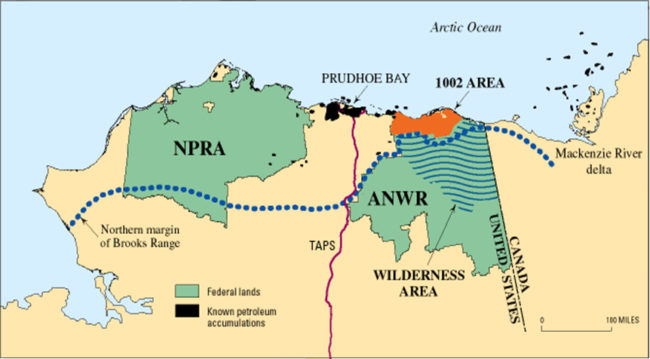
Over the past 25 years, Alaska’s Legislature has passed nearly a dozen resolutions asking Congress to allow drilling in the coastal plain of the Arctic National Wildlife Refuge. But this year, something is different. There’s been more push back and public testimony opposed to passing an ANWR resolution.
When Donetta Tritt talks about her hometown of Arctic Village, she talks about caribou.
“When I was little, I didn’t know that caribou was called caribou,” Tritt said. “I called it meat. And so I’d be like, look mom, meat! I’d see, like, a caribou running on the mountain and I’d be like ‘meat’!”
Arctic Village sits on the edge of the Arctic National Wildlife Refuge (ANWR), in the Brooks Range. Just 152 people lived there in 2010.
Tritt, who lives in Fairbanks now, flew to Juneau to represent her Neetsai Gwich’in people and talk about the importance of the Porcupine caribou herd.
She’s protesting a resolution that has become somewhat of a habit for the Legislature to pass, a call on Congress to open up the refuge to drilling.

The Arctic coastal plain of ANWR is an important calving and birthing ground for the Porcupine herd, and Tritt said that drilling in the refuge could have serious ramifications for the lives of people in Arctic Village and the Gwich’in as a whole.
But not everyone in her district feels that way. The Kotzebue Democrat who introduced the resolution, Rep. Dean Westlake, is chairman of the House’s Arctic committee. His district covers the North Slope and includes the refuge. And he doesn’t dispute that the environmental concerns of some of his constituents are important.
But, he said, his district desperately needs an economic boost. And he’s looking toward an industry that has provided that boost to the North Slope and surrounding villages for decades.
“When I was a young man, I worked on the North Slope like a lot of young people did to go pursue a dream. The money is there,” Westlake said.
Westlake said he depends on the land for food and honors the environment, but he believes that responsible development is key to the health of the region.
These are not new arguments for and against opening the refuge to drilling. They’re arguments that have played out in legislative hearings for decades at the state level, though not usually at this scale.
Princess Johnson, from Fairbanks, has been following these resolutions for a long time, but this year, she decided to visit Juneau in person.
“Typically, this is a resolution that gets passed every year in our state Legislature,” she said.
When she’s showed up to testify before, there have only been a handful of people there. “A couple of people that are for that, a couple people that are speaking out against it, and we know that it’s just standard,” she said.
Johnson said the political environment has become extreme in the last year and it has motivated her and activists like her to be louder about their concerns.
This is the first time she’s traveled to Juneau to talk to legislators. She’s used to skipping state politics altogether and going straight to Washington D.C. to get an audience with federal politicians.
The state’s resolution, while largely ceremonial, could also carry more weight this year with the state’s delegation in D.C. Alaska’s U.S. senators Lisa Murkowski and Dan Sullivan introduced a bill in January to open up a portion of the refuge for drilling, and on the House side, Alaska Representative Don Young introduced a similar bill.
And with the new presidential administration, and a Republican-led Congress, these bills may have a better chance at gaining traction.
It’s an uphill battle for Tritt, Johnson and dozens of people who testified before the two state House committees that have heard the resolution so far. Both committees heard an overwhelming amount of testimony against the resolution, then quickly passed them through.
Even lawmakers who support environmental arguments against opening ANWR won’t vote against it.
“The folks, particularly in this room who testified about their concerns, I don’t view them as wrong,” said Rep. Andy Josephson, D-Anchorage. “They have a long view, and I have real concerns that, that long view is shortening. That is, I’m worried about my planet. They make some very good arguments and they’re among the finest Alaskans I’ve met. Having said that … my state needs revenue.”
And with arguments like that, it’s likely that the resolution will continue its path to sail smoothly through the Legislature for the 12th time.
